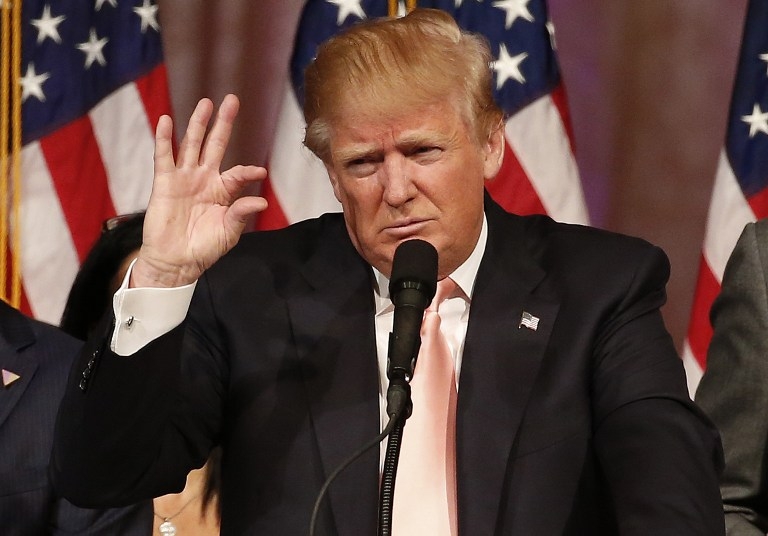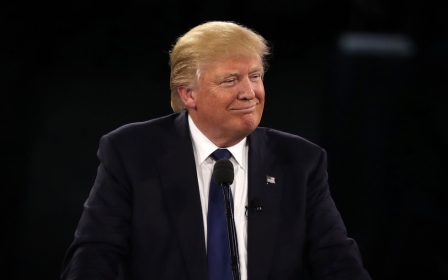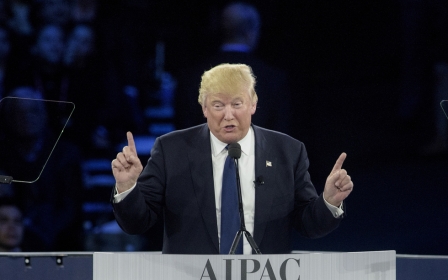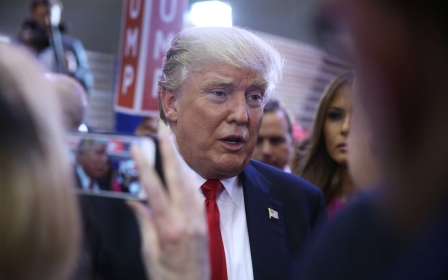Saudi Arabia 'would not exist without US protection,' Trump claims

US presidential hopeful Donald Trump has said he could halt US purchases of oil from Saudi Arabia and other Gulf states unless they reimburse Washington for its military efforts against the Islamic State (IS) group or send ground troops to join the fight.
In an interview with the New York Times published on Saturday, Trump, the outspoken outsider who leads the race to be the Republican candidate in November's election, suggested that Saudi Arabia would not exist without “the cloak of American protection”.
Trump also suggested that the US would have been better off in the Middle East if US President Barack Obama and his predecessor George W Bush had “gone to the beach” for the past 15 years rather than getting involved in the region.
“If our presidents would have just gone to the beach and enjoyed the ocean and the sun, we would’ve been much better off in the Middle East, than all of this tremendous death, destruction, and you know, monetary loss,” he said.
Trump questioned the benefits of NATO membership for the US and set out what he described as an “America first” foreign policy, saying: “We will not be ripped off anymore.”
“We defend everybody,” he said. “When in doubt, come to the United States. We’ll defend you. In some cases free of charge.”
Referring to Saudi Arabia and other Gulf states, Trump said they should “substantially reimburse” the US for its efforts against IS or face economic repercussions, suggesting that “the reason we’re in the Middle East is for oil, and all of a sudden we’re finding out that there’s less reason to be there now”.
“If Saudi Arabia was without the cloak of American protection, I don’t think it would be around,” he said. ”It would be, you know, a catastrophic failure without our protection.”
US policy on Syria is 'madness'
On Syria, Trump said the current policy of supporting the overthrow of Syrian President Bashar al-Assad and fighting IS was “idiocy and madness” and that IS was “by far the greater problem," although Assd was “not a good man”.
Trump also criticised German Chancellor Angela Merkel's handling of the European refugee migration crisis, which has seen hundreds of thousands of people from conflicts and instability in Syria, Iraq, Afghanistan and other countries seek refuge in Europe.
He suggested that Germany and the Gulf states should pay to set up “safe zones” in Syria for refugees and take responsibility for their protection once built.
“Germany is being destroyed by Merkel’s naivete, or worse,” he said.
According to the New York Times, Trump's foreign policy would be based on using economic bargaining and negotiation to restore the US to a central role in the world.
“He approached almost every current international conflict through the prism of a negotiation, even when he was imprecise about the strategic goals he sought,” the paper noted.
Trump criticised the current administration's handling of this year's nuclear deal with Iran, suggesting they should have walked away a few times, but he appeared unaware of continuing US sanctions that limit American businesses' ability to trade in Iran despite the release of billions of dollars of Iranian assets that had previously been frozen by the US.
“Uh, excuse me?” Trump replied when told that US companies were still forbidden by law from selling planes to Iran
“So, how stupid is that? We give them the money and we now say, ‘Go buy Airbus instead of Boeing,’ right?”
In the Israel-Palestine conflict, Trump said he would “love to see if a real deal could be made,” and he supported a two-state solution, but said that the Palestinian Authority had to “stop the terror” and suggested that Palestinian children were “aspiring to grow up to be terrorists”.
“Now, I’m not sure [a deal] can be made, there’s such unbelievable hatred, there’s such, it’s ingrained, it’s in the blood, the hatred and the distrust, and the horror,” he said.
New MEE newsletter: Jerusalem Dispatch
Sign up to get the latest insights and analysis on Israel-Palestine, alongside Turkey Unpacked and other MEE newsletters
Middle East Eye delivers independent and unrivalled coverage and analysis of the Middle East, North Africa and beyond. To learn more about republishing this content and the associated fees, please fill out this form. More about MEE can be found here.




